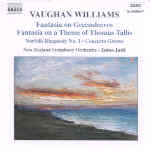Naxos has made some very fine recordings in New Zealand, and some not so fine. Unfortunately this new release falls into the latter category. James Judd leads a frankly weird performance of the stunningly beautiful Tallis Fantasia. The second string orchestra sounds miles away when contrasted to the main body, making their exchanges excessively disjointed, but when interacting with the solo quartet the smaller group suddenly pops up loudly front and center. And the soloists are far too close; the violist’s breathing is quite audible. Interpretively, the problems start right at the beginning: Judd’s “largo sostenuto” is certainly slow, but hardly well sustained. He plods through the introduction and initial statement of Tallis’ theme, and then practically double-times the fortissimo counterstatement–a needlessly cheap tactic. “Appassionato” does not mean “play it faster.”
Judd’s attention to dynamics is also extremely haphazard–in particular he’s consistently too loud in passages calling for the full string orchestra (possibly also a fault of the engineering), and he starts the run-up to the big climax so forcefully he has nowhere to build. When the climax arrives (“Largamente”, says the composer), instead of broadening the tempo Judd starts accelerating, a curious move particularly as he ignores the preceding “animato” indication entirely. In other words, he’s slow when he should be quick, and quick when he should be slow. There’s nothing wrong with tempo flexibility for dramatic effect, and the score allows plenty of freedom in this arena, but Judd’s decisions practically amount to a misrepresentation of the shape of the piece. The last couple of minutes especially feature an almost random assortment of gratuitous tempo adjustments, none of them possessing any basis in the written text, or more to the point, clear expressive purpose. Of course, the music itself is so gorgeous that anyone who doesn’t know the work might not notice anything wrong, but fans of the composer and of this piece will likely disapprove.
In both the Norfolk Rhapsody No. 1 and In the Fen Country, Judd’s about a minute slower than Boult’s EMI versions, and while timings don’t tell all, the lack of tension and forward momentum does. The Rhapsody, in particular, takes too long to get going (it really never does), and while all fens tend to meander, they don’t have to do it this much. The Greensleeves Fantasia plays itself, and Judd doesn’t do anything bizarre to it, but the Concerto Grosso was an odd choice to conclude the disc, being one of the composer’s least interesting and most utilitarian pieces. Although Judd doesn’t attempt to make of the music anything other than the mere pleasantry that it is, the players don’t sound as if they’re trying very hard, offering playing short on rhythmic snap and precision. As noted above, the sonics are poorly balanced in the Tallis Fantasia, but are otherwise quite good. There’s nothing scandalously bad here, but also nothing that comes anywhere near the quality (and value too) of the best recorded competition.
































